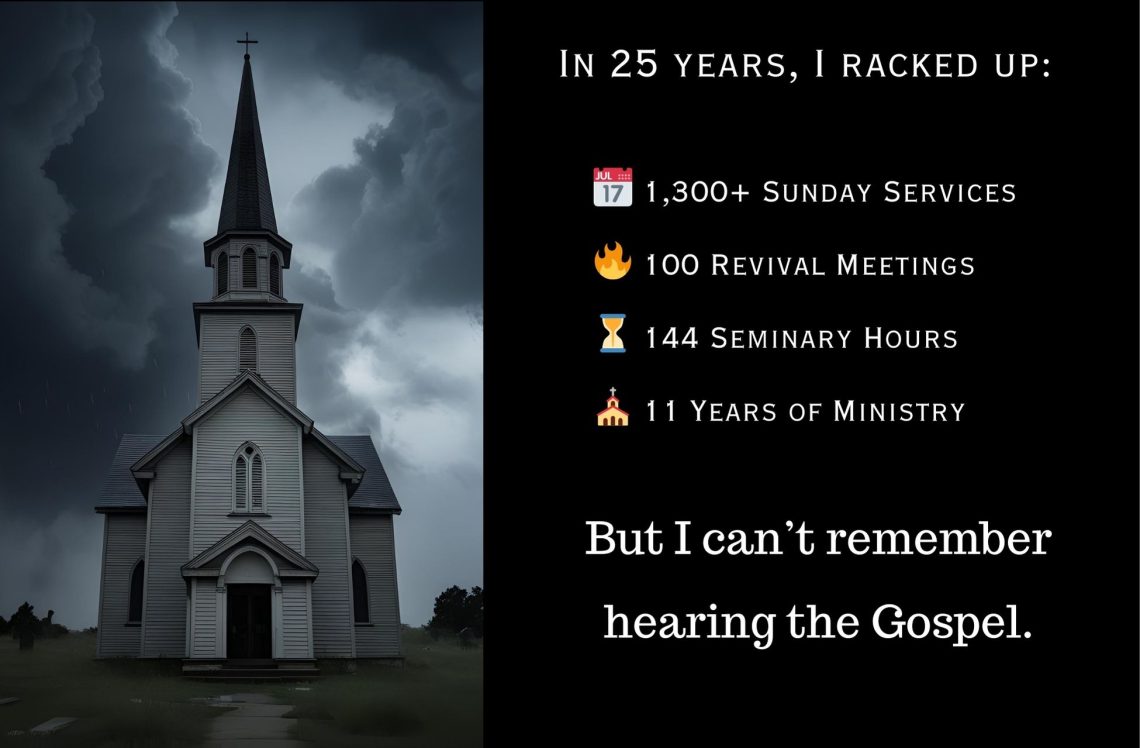
25 Years in Church—But I Can’t Remember Hearing the Gospel
𝐇𝐨𝐰 𝐝𝐨𝐞𝐬 𝐬𝐨𝐦𝐞𝐨𝐧𝐞 𝐬𝐩𝐞𝐧𝐝 𝟐𝟓 𝐲𝐞𝐚𝐫𝐬 𝐢𝐧 𝐜𝐡𝐮𝐫𝐜𝐡 𝐰𝐢𝐭𝐡𝐨𝐮𝐭 𝐞𝐯𝐞𝐫 𝐡𝐞𝐚𝐫𝐢𝐧𝐠 𝐭𝐡𝐞 𝐆𝐨𝐬𝐩𝐞𝐥?
I believe it happens when pulpits are filled with men who 𝐰𝐡𝐨 𝐝𝐨 𝐧𝐨𝐭 𝐤𝐧𝐨𝐰 𝐭𝐡𝐞 𝐆𝐨𝐬𝐩𝐞𝐥. While they may preach something religious, or use a lot of churchy vernacular, or demand a certain moral standard—some churches never actually present 𝐭𝐡𝐞 𝐆𝐨𝐬𝐩𝐞𝐥 𝐨𝐟 𝐉𝐞𝐬𝐮𝐬 𝐂𝐡𝐫𝐢𝐬𝐭.
So, what did I learn in 25 years of church, if not the Gospel? Let’s break it down.
![]() 𝐒𝐚𝐥𝐯𝐚𝐭𝐢𝐨𝐧: 𝐀 𝐂𝐨𝐦𝐦𝐢𝐭𝐦𝐞𝐧𝐭 𝐭𝐨 “𝐂𝐡𝐚𝐧𝐠𝐞”
𝐒𝐚𝐥𝐯𝐚𝐭𝐢𝐨𝐧: 𝐀 𝐂𝐨𝐦𝐦𝐢𝐭𝐦𝐞𝐧𝐭 𝐭𝐨 “𝐂𝐡𝐚𝐧𝐠𝐞”
At thirteen, I responded to the typical emotionally charged “conversion” message, but salvation wasn’t presented as faith in Christ—it was presented as “change.” In the Holiness Movement, “change” was inherently understood as: conformity.
My perception, based on what was presented, was that salvation was a hyper-dedicated commitment to being “good.” It meant quitting sin, following the dress code, and keeping the group-approved rules. The moment I made this commitment and looked the part, I was accepted by the group as “saved.” No questions. No discipleship. No further teaching.
To highlight how little salvation was actually understood:
![]() As a student, I sincerely asked a highly respected adjunct professor, “What are we saved from?” He had no idea. He was unable to answer my question.
As a student, I sincerely asked a highly respected adjunct professor, “What are we saved from?” He had no idea. He was unable to answer my question.
![]() A SOTERIOLOGY teacher (soteriology is the study of salvation) taught that if a woman got saved while wearing pants, left church still in pants, got hit by a car, and died in pants—she would go to hell.
A SOTERIOLOGY teacher (soteriology is the study of salvation) taught that if a woman got saved while wearing pants, left church still in pants, got hit by a car, and died in pants—she would go to hell.
![]() 𝐀𝐬𝐬𝐮𝐫𝐚𝐧𝐜𝐞 𝐨𝐟 𝐒𝐚𝐥𝐯𝐚𝐭𝐢𝐨𝐧: 𝐆𝐫𝐨𝐮𝐩 𝐀𝐩𝐩𝐫𝐨𝐯𝐚𝐥
𝐀𝐬𝐬𝐮𝐫𝐚𝐧𝐜𝐞 𝐨𝐟 𝐒𝐚𝐥𝐯𝐚𝐭𝐢𝐨𝐧: 𝐆𝐫𝐨𝐮𝐩 𝐀𝐩𝐩𝐫𝐨𝐯𝐚𝐥
Assurance of salvation wasn’t found in Christ’s finished work—it was found in pastoral approval and group acceptance. My entire sense of salvation was tied to the group. If the group rejected me, I didn’t “feel” saved anymore. This meant particular efforts had to be made to “secure acceptance.”
![]() 𝐒𝐢𝐧: 𝐀 𝐥𝐢𝐬𝐭 𝐨𝐟 𝐦𝐨𝐫𝐚𝐥 𝐬𝐡𝐨𝐫𝐭𝐜𝐨𝐦𝐢𝐧𝐠𝐬
𝐒𝐢𝐧: 𝐀 𝐥𝐢𝐬𝐭 𝐨𝐟 𝐦𝐨𝐫𝐚𝐥 𝐬𝐡𝐨𝐫𝐭𝐜𝐨𝐦𝐢𝐧𝐠𝐬
Sin wasn’t presented as a nature—it wasn’t presented as an all-encompassing condition of the human soul. It was presented as a simple list of things you could avoid. This led to the belief that perfection was possible—just “check the right boxes.” People could eliminate smoking, drinking, cussing, movies, jewelry, and pants—and be certain they were in the clear, but then really hideous things were winked at and concealed. Sin was never acknowledged as the very state of our being, which explains why salvation was presented the way it was.
We were also taught to hunt for sin under every rock, and hence, discover it even where it wasn’t. The constant striving for moral perfection, meant you had to keep finding things to give up. This turned into self-erasure on an epic scale. To this day I struggle with an ingrained shame and guilt over basic, neutral things like enjoying a hobby or keeping a cherished possession. One time I prayed for weeks for God to give me “victory” over chocolate, simply because it was something I liked.
![]() 𝐆𝐨𝐝 = 𝐓𝐡𝐞 𝐏𝐮𝐧𝐢𝐬𝐡𝐞𝐫 𝐚𝐧𝐝 𝐓𝐡𝐞 𝐏𝐚𝐬𝐭𝐨𝐫
𝐆𝐨𝐝 = 𝐓𝐡𝐞 𝐏𝐮𝐧𝐢𝐬𝐡𝐞𝐫 𝐚𝐧𝐝 𝐓𝐡𝐞 𝐏𝐚𝐬𝐭𝐨𝐫
I had two key takeaways about God:
![]() He was presented as an over-eager, unhinged, merciless punisher. We were made to feel like God was just waiting for us to mess up so He could kill us in a car accident or make the rapture occur the second we did. If something bad happened, it was made plain that God was displeased with us, and we had to figure out why and fix it.
He was presented as an over-eager, unhinged, merciless punisher. We were made to feel like God was just waiting for us to mess up so He could kill us in a car accident or make the rapture occur the second we did. If something bad happened, it was made plain that God was displeased with us, and we had to figure out why and fix it.
![]() The pastor was placed on a pedestal as “anointed.” He was the one who heard “God’s voice” on our behalf. He informed us of everything God expected from us. We were expected to submit to him with undying loyalty and obedience. We were trained to be entirely dependent upon him. We weren’t supposed to question him. If he did something wrong, we were to trust he was operating according to God’s desire in ways we did not understand in our lowly position. He knew God’s will for us. He made decisions for us. If he was happy with us, God was happy with us. If he was displeased, God was displeased. The pastor, functionally, became God in our lives. He was the all-consuming element of our lives, and our standing with the pastor was the direct measure of our standing with God.
The pastor was placed on a pedestal as “anointed.” He was the one who heard “God’s voice” on our behalf. He informed us of everything God expected from us. We were expected to submit to him with undying loyalty and obedience. We were trained to be entirely dependent upon him. We weren’t supposed to question him. If he did something wrong, we were to trust he was operating according to God’s desire in ways we did not understand in our lowly position. He knew God’s will for us. He made decisions for us. If he was happy with us, God was happy with us. If he was displeased, God was displeased. The pastor, functionally, became God in our lives. He was the all-consuming element of our lives, and our standing with the pastor was the direct measure of our standing with God.
![]() 𝐉𝐞𝐬𝐮𝐬: 𝐀 𝐁𝐞𝐧𝐞𝐟𝐚𝐜𝐭𝐨𝐫, 𝐛𝐮𝐭 𝐍𝐨𝐭 𝐚 𝐒𝐚𝐯𝐢𝐨𝐫
𝐉𝐞𝐬𝐮𝐬: 𝐀 𝐁𝐞𝐧𝐞𝐟𝐚𝐜𝐭𝐨𝐫, 𝐛𝐮𝐭 𝐍𝐨𝐭 𝐚 𝐒𝐚𝐯𝐢𝐨𝐫
There was some understanding that Jesus died for sins, but He was primarily seen as a means to a clean slate—as in the launching board of moral perfection. He was not presented as the actual Savior we needed to trust for salvation. There was nothing about trusting Him or His righteousness. Jesus may have been presented like a free ticket out of hell, or a way to make it in the rapture. The prevailing idea was that we could have forgiveness for past sin, but we were ultimately “kept” by our adherence to Holiness standards and our ability to maintain a perfectly “sinless” life.
Jesus was mostly preached as a benefactor of temporal blessings.
“He makes a way when there is no way” wasn’t about salvation—it was about:
Paying your bills
Healing your sickness
Fixing your circumstances
Finding your lost keys
The idea that “He is faithful” was not equated with faithful to preserve your salvation, but faithful to do things for you.
In the Holiness Movement, I had zero comprehension of Jesus as the promised, prophesied Deliverer for sinful mankind. I learned these things after I exited the movement.
![]() 𝐓𝐡𝐞 𝐇𝐨𝐥𝐲 𝐒𝐩𝐢𝐫𝐢𝐭: 𝐀𝐧 𝐄𝐦𝐨𝐭𝐢𝐨𝐧𝐚𝐥 𝐒𝐩𝐞𝐜𝐭𝐚𝐜𝐥𝐞
𝐓𝐡𝐞 𝐇𝐨𝐥𝐲 𝐒𝐩𝐢𝐫𝐢𝐭: 𝐀𝐧 𝐄𝐦𝐨𝐭𝐢𝐨𝐧𝐚𝐥 𝐒𝐩𝐞𝐜𝐭𝐚𝐜𝐥𝐞
The “Holy Spirit” was the absolute focal point of religious activity.
It was taught that if we lived a perfectly holy life, the “Holy Ghost” would come upon us, indwell us, and would empower us to live a supernatural life. The problem is that this entity was suspect at best, demonic at worst. I shudder to recall some of the things I have seen attributed to this “spirit.” Church services operated under an obsession with recapturing past miracles and “spiritual outpourings.” A “great service” meant people spinning, running the backs of pews, head-banging, rolling, laughing hysterically, percolating like tea kettles… It was an exhibition. It had no practical value for life. When I invited this “spirit” into myself, and appealed to this “spirit”—it led me deeper and deeper into error. The experiences were real and they were convincing, but the error this false entity led me to is telling.
![]() 𝐇𝐞𝐚𝐯𝐞𝐧: 𝐊𝐞𝐞𝐩 𝐭𝐡𝐞 𝐒𝐭𝐚𝐧𝐝𝐚𝐫𝐝𝐬 𝐚𝐧𝐝 𝐌𝐚𝐤𝐞 𝐢𝐭 𝐈𝐧
𝐇𝐞𝐚𝐯𝐞𝐧: 𝐊𝐞𝐞𝐩 𝐭𝐡𝐞 𝐒𝐭𝐚𝐧𝐝𝐚𝐫𝐝𝐬 𝐚𝐧𝐝 𝐌𝐚𝐤𝐞 𝐢𝐭 𝐈𝐧
Holiness standards were the key to getting into heaven.
Keep the rules. Follow the dress code. Be perfect.
![]() 𝐒𝐜𝐫𝐢𝐩𝐭𝐮𝐫𝐞: 𝐌𝐲𝐬𝐭𝐢𝐜𝐚𝐥 𝐚𝐧𝐝 𝐌𝐚𝐥𝐥𝐞𝐚𝐛𝐥𝐞
𝐒𝐜𝐫𝐢𝐩𝐭𝐮𝐫𝐞: 𝐌𝐲𝐬𝐭𝐢𝐜𝐚𝐥 𝐚𝐧𝐝 𝐌𝐚𝐥𝐥𝐞𝐚𝐛𝐥𝐞
Scripture was often interpreted in mystical ways. Verses were preached out of context, used to support “cute ideas” preachers came up with. Old Testament prophecies of Christ were never taught as being about Christ—they were repurposed into personal “victory” verses. We were never taught context, theology, or exegesis. Even though I read the Bible daily, my entire framework for reading it made the Bible unreliable and incredibly dangerous, and prevented me from seeing the plain truth that was right in front of me, had I known to read it in context.
![]() 𝐓𝐡𝐞 𝐂𝐡𝐮𝐫𝐜𝐡: 𝐎𝐧𝐥𝐲 𝐓𝐡𝐨𝐬𝐞 𝐖𝐡𝐨 𝐋𝐨𝐨𝐤 𝐋𝐢𝐤𝐞 𝐔𝐬 𝐖𝐢𝐥𝐥 𝐌𝐚𝐤𝐞 𝐈𝐭
𝐓𝐡𝐞 𝐂𝐡𝐮𝐫𝐜𝐡: 𝐎𝐧𝐥𝐲 𝐓𝐡𝐨𝐬𝐞 𝐖𝐡𝐨 𝐋𝐨𝐨𝐤 𝐋𝐢𝐤𝐞 𝐔𝐬 𝐖𝐢𝐥𝐥 𝐌𝐚𝐤𝐞 𝐈𝐭
It was engrained into our minds that the only truly saved individuals were those in the Holiness Movement adhering to Holiness standards. By leaving you proved you were an apostate.
So…
The Gospel of the Holiness Movement in a Nutshell:
![]() Spiritual Elitism
Spiritual Elitism
![]() Perfect conformity, Perfect submission to authority
Perfect conformity, Perfect submission to authority
![]() Obsession with a supernatural power, and endless striving to meet an impossible spiritual bar.
Obsession with a supernatural power, and endless striving to meet an impossible spiritual bar.
This is why so many people in legalistic and counterfeit religious systems remain trapped, confused, and exhausted. They are burdened by religion but never set free by the Gospel.

(The numbers in this graphic are approximate but conservatively low estimates. As a member of the HM, I typically attended church three times a week, meaning actual church attendance could be three times higher than my estimate. I estimated four “revival meetings” per year, but the true number is likely much higher when factoring in camp meetings, conventions, youth camps, and regularly scheduled revivals.)




